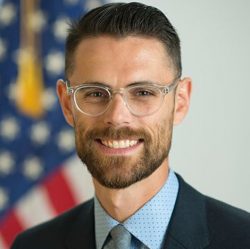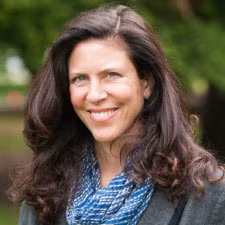When it comes to innovation in Medicaid — the focus of the CHCF Innovation Fund — Andrey Ostrovsky, MD, has worn an impressive number and variety of hats. Most recently, he served as chief medical officer at the Center for Medicaid and CHIP Services (CMCS). Prior to CMCS, he cofounded Care at Hand, a predictive analytics company acquired by Mindoula Health. He is now both a health care investor and CEO of Concerted Care Group, a provider of substance abuse treatment programs. Last but not least, he also still manages to practice medicine as an attending physician at Children’s National Medical Center in Washington, DC.
Ostrovsky was in the news recently when he abruptly left CMCS after having learned that a relative’s death was caused by an opioid overdose. He has written and spoken to many media outlets about the impact of that discovery. Ostrovsky recently sat down with me for a conversation about his time at CMCS and the opportunities and pitfalls awaiting entrepreneurs and investors entering the Medicaid space. This interview has been condensed and lightly edited for clarity.
Q: You were at CMCS until December 2017. Tell us about your time there, and about how you morphed from start-up founder to government administrator.
A: It’s certainly not a role I ever thought I would have. I had zero intention of working in government. I was about to sell Care at Hand, the start-up I had founded, and was thinking of getting into investing.

Then Patrick Conway, a mentor of mine who ran the Center for Medicare and Medicaid Innovation (CMMI) at the time, told me he had a job for me. Although I was relatively inexperienced in some ways, I did have a skill set that Patrick valued, and that was in the area of change management. CMCS was seen by many as the laggard within the Center for Medicare & Medicaid Services (CMS), lacking the skills needed to truly innovate. Patrick tasked me with transforming CMCS into a learning organization, and I accepted that challenge.
I started before the 2016 election and began by absorbing as much information as I could. I had just finished that learning process and identified areas ripe for high-impact improvement when the election happened.
Q: What is your opinion of what’s been said and done to Medicaid since the election? What do you think ought to be done instead?
A: The solution for improving Medicaid certainly isn’t cutting or assaulting it. The solution is using the dollars more efficiently and empowering states to innovate. CMCS needs to develop the processes and skills, such as service design and lean management, to facilitate more efficient use of dollars and innovation on the state level.
I certainly hope this administration doesn’t turn Medicaid into a bunch of underfunded block grants, but even if it does, there will be new pain points. The Medicaid space will always have problems that are addressable with scalable solutions. That’s what makes it exciting for entrepreneurs and investors.
Q: We certainly agree that Medicaid is an exciting market for innovative solutions. We were both talking about this to many people at the recent J.P. Morgan Healthcare and StartUp Health Festival events in San Francisco. Where within Medicaid has innovation had the most impact or success so far?
A: The big innovation successes are still yet to come. The reality is most solutions used by Medicaid right now are not transformative. For example, Medicaid spends about $8 billion to $10 billion a year on health IT. Most of that IT money still goes to really large, very opportunistic corporations. They are interested in securing government contracts — not in transforming anything. That’s an enormous wasted opportunity, and it’s only one sliver. That’s just $10 billion of the $530 billion Medicaid spends per year. There is still a huge amount of untapped opportunity.
Q: As a former founder yourself and now an investor, what qualities do you think are vital for founders seeking success in the Medicaid market?
A: I think it comes down to these two things: First, you need to have had prior success as an entrepreneur — or a meaningful failure, which is just as valuable in my mind. It’s fine if that experience happened in another space, such as the consumer market, so long as it gave you some level of experience and sophistication. Second, you need some personal experience that enables you to relate to the pain points experienced by Medicaid populations. You need to have felt or witnessed what it means to be in poverty or have a disability. That connection not only helps you develop better solutions, but it creates that burning, incessant drive necessary in a space like Medicaid. What else will carry you through the dual grinds of hyperregulation and sales?
Q: How do we convince more investors to pay attention to the Medicaid space?
A: Most investors are just professionals fulfilling their fiduciary obligations to create as much value as possible. Aside from explicitly socially conscious investors, most won’t be convinced by pitches from people like us to invest in the Medicaid space. Things won’t really change until investors see the first big exit [a sale or initial public offering] or multimillion-dollar valuation of a company in this space. The burden is on the entrepreneurs and us earlier investors to nurture our companies so we do start to see big valuations and exits. Once that happens, I believe everything will fall into place. The market is there. The pain points are there. The dollars are there.
Q: One start-up getting a lot of hype about possibly becoming that first mega success is Cityblock, a Google spinoff whose stated mission is “to radically improve the health of urban communities, one block at a time.” You recently invested in it yourself. What do you think sets it apart?
A: I am of course biased, but in Cityblock I see a stellar team going after an important population. Your average Medicaid managed care organization gives little thought or investment to the upstream determinants of health, such as transportation access or food insecurity. Their core competence is in calculating risk and premiums — not in coordinating care. By partnering with Cityblock, managed care organizations can stick to what they’re good at and let Cityblock handle the rest.
The key question driving the Cityblock team is: How do we manage anything and everything that will enable a consumer to thrive in their community? It also means thinking beyond the traditional provider network, for example, by considering how to create and manage a network of community-based organizations.
Q: You recently joined Concerted Care Group, a Baltimore-based provider of substance abuse treatment services, as CEO. What excites you about what this group is doing?
A: At CMCS, I led Medicaid’s opioid strategy, but it was on a very macro level — policies, systems, stigma. Then, in October 2017, my family realized that my uncle, who we thought had passed away two years ago due to suicide, had actually died of a drug overdose. That macro policy issue suddenly became very personal. I knew I had to work on this problem — I just had to decide from what angle.
I met Concerted Care Group’s (CCG’s) founder, who used to be a developer of low-income housing, and was struck by his unusual approach. Beyond providing the full range of medication-assisted treatment services, including counseling and primary care, he had also invested heavily in those upstream resources we discussed earlier. From the start, he had invested in housing, transportation, and other needs that Medicaid does not pay — or pay much — for but that he knew were the right thing to provide to this population. That’s not your average investor’s approach.
What’s exciting is that those upfront costs can now work to our advantage. We already have within our network everything our clients need to thrive. That enables us to take more risk off the hands of payers and feel confident that we can deliver the best possible outcomes for them and our clients.
Another exciting aspect is that Concerted Care Group has a parallel investment fund, All Points North Capital, for incubating innovations. I believe those technology investments will be the key to scaling CCG and eventually, hopefully, turning it into a national model for substance abuse treatment.
Authors & Contributors




